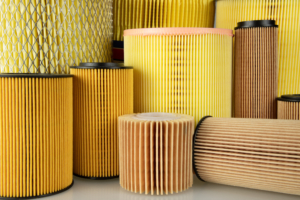 Whether you drive a car, truck, or van, clean air and fluids are essential to your vehicle’s optimal performance. Various filters throughout your vehicle remove contaminants and debris from oil and fuel and ensure that both your engine and your passengers have an ample supply of clean air.
Whether you drive a car, truck, or van, clean air and fluids are essential to your vehicle’s optimal performance. Various filters throughout your vehicle remove contaminants and debris from oil and fuel and ensure that both your engine and your passengers have an ample supply of clean air.
Let’s quickly review a few basic types of filters, what they do, and how often to replace your filters to ensure peak performance.
Oil Filter
Motor oil is an essential lubricant that helps engines run smoothly. But over time, dirt, grit, and other contaminants can form small particles that can increase wear on your engine. You should change your oil filter regularly to avoid premature engine wear and to extend the operating life of your vehicle. Most manufacturers recommend that you change your vehicle’s oil filter every 3000–5000 miles (check your owner’s manual).
Air Filter
Your engine relies on airflow to function properly. Your vehicle’s air filter removes grime, dirt, particulates, and other contaminants from your engine’s air intake. A dirty filter can deprive your engine of clean air, and particulates can cause increased wear on your engine. Most manufacturers suggest changing your air filter every year or 12000 miles (check your vehicle’s manual for specifics).
Cabin Air Filter
Like your engine, you and your passengers need an ample supply of fresh air. The cabin filter in your vehicle’s ventilation and air conditioning system is responsible for removing contaminants such as dust, pollen, and even mold spores from the air you breathe. It’s recommended that you change your vehicle’s cabin air filter every year or 12000 miles (see your owner’s manual for specifics).
PCV Valves
The positive crankcase ventilation (PCV) valve helps to remove the unwanted byproducts of combustion, called “blow-by” gases. Essentially, it is a one-way valve attached to the crankcase, preventing unwanted combustion gases from seeping back into the crankcase. Not all vehicles have PCV valves, so check your manual. Most manufacturers recommend changing the PCV valve in your vehicle annually or after 12000 miles.
Breather Elements
If your vehicle has a PCV valve, it works with the breather elements to reduce the amount of contaminated vapor emissions. Changing your breather element along with each filter change is easy, quick, and inexpensive. Breather elements should be changed annually or after 12000 miles.
Transmission Filter
Your vehicle’s transmission is a complex device with many moving parts. It’s also essential in transferring power from the engine to the wheels. Road grime and other contaminants can get into your transmission and reduce your vehicle’s operating efficiency. Your transmission filter removes potential contaminants and thus reduces wear and premature aging of your car’s transmission. It’s recommended that you change your transmission filter every 2 years or 24000 miles (see your owner’s manual for details).
Fuel Filter
Unless you drive an electric, your vehicle relies on fuel to operate. But fuel lines can quickly become contaminated with dirt or road grit, robbing your vehicle of its operating efficiency. A clogged fuel line can result in poor starting, stalling, reduced fuel efficiency, and even engine damage. Most recommend that you have our fuel filter changed annually or every 12000 miles.
We hope you found this fact sheet helpful. At Main Line Transmissions, we care about the health of your vehicle. While we do not do general vehicle maintenance, we are here to answer questions your might have when you come in for transmission service.

 : 610-647-8484
: 610-647-8484 : 610-647-8405
: 610-647-8405